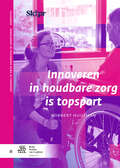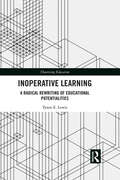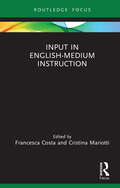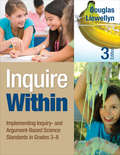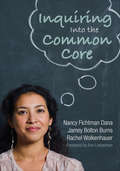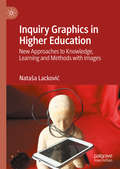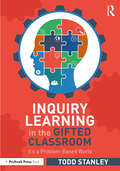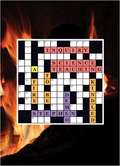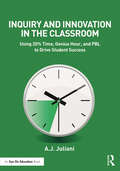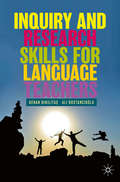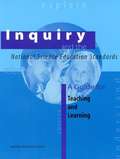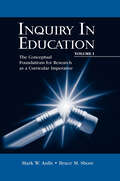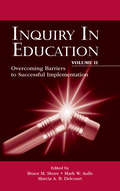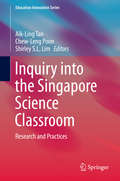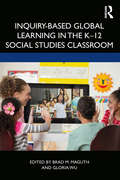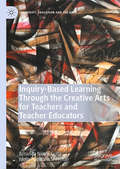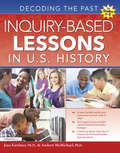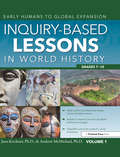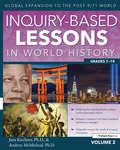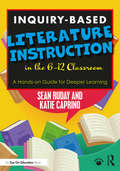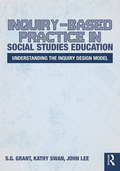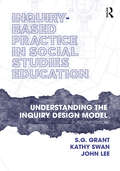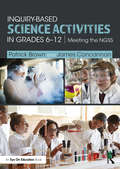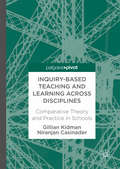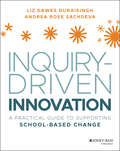- Table View
- List View
Innoveren in houdbare zorg is topsport
by Robbert Huijsmanhet boek bevat een slectie van weblogs van de hand van Robbert Huijsman over het anders en slimmer organiseren van de zorg. Eerder gepubliceerd op Skipr.nl in periode 2009-2013.
Inoperative Learning: A Radical Rewriting of Educational Potentialities (Theorizing Education)
by Tyson E. LewisInoperative Learning embodies a weak philosophy of education. It does not offer a set of solutions or guidelines for improving educational outcomes, but rather renders taken-for-granted assumptions about the theory-practice coupling inoperative. By arguing that such logic reduces education to instrumental ends, this book presents a challenge to contemporary notions of education as outcomesbased, goal-directed learning. From the perspective of learning, the neutralization of progress, growth, and maturity would usually be seen as obstacles needing to be overcome on the path toward set goals. Yet Lewis argues that a serious investigation of inoperativity opens up possibilities that would be otherwise unavailable in a world fixated on the question of learning. In dialogue with philosophers (Agamben, Benjamin, and Esposito), authors (Kafka and Walser) and qualitative researchers (Lather), Lewis turns our collective attention to what remains when concepts such as learning, child development, teacher effectivity, and personal growth are left idle. Inoperative Learning presents a radical rewriting of educational possibilities. It should therefore be of great interest to educational researchers and educational philosophers concerned with the question of alternative logics of education beyond learning. The book may also be of interest to theorists in the critical humanities that are engaged in education as a thematic concern in their research and classroom practices.
Input in English-Medium Instruction (Routledge Focus on English-Medium Instruction in Higher Education)
by Francesca Costa Cristina MariottiThis edited book investigates the input provided by lecturers in English-Medium Instruction (EMI) to reveal the characteristics of both written and oral input in EMI settings and their pedagogical implications. The book works on two assumptions: firstly, that field exposure to input is the prime mover of the teaching-learning process and secondly, that its quality is fundamental for the development of discipline-specific knowledge with particular reference to university settings. The volume is timely as it contains original research addressing both theoretical reflections and practical information on how content lecturers can enhance the effectiveness of their teaching practice through English including a relatively unexplored and increasingly relevant topic represented by the synergy between spoken input and written and multimodal materials. Moreover, it provides insight for EAP teachers and EMI training professionals into how lecturer training programmes and activities can be improved by focusing on communicative functions and presentation strategies that can selectively address and improve students’ mastery of disciplinary discourse.
Inquire Within: Implementing Inquiry- and Argument-Based Science Standards in Grades 3-8
by Douglas J. LlewellynYour definitive guide to inquiry- and argument-based science—updated for today’s standards! Doug Llewellyn’s two big aims with this new edition of Inquire Within? To help you engage students in activities and explorations that draw on their big questions, then build students’ capacity to defend their claims. Always striking a balance between the “why” and the “how,” new features include how to Teach argumentation, a key requirement of both the Common Core and NGSS Adapt your existing science curricula and benefit from the book’s many lesson plans Improve students’ language learning and communication skills through inquiry-based instruction Develop your own inquiry-based mindset
Inquiring Into the Common Core
by Nancy Fichtman Dana Jamey B. Burns Rachel M. WolkenhauerCommon Core implementation begins with asking the right questions! While the Common Core couldn’t be clearer about what to teach, they never quite tackle how to teach. That’s what makes Inquiring into the Common Core such an essential resource. It offers teachers an inquiry-based professional development model for achieving greater understanding of the standards themselves, then determining best ways to realize desired outcomes. Posing questions to stimulate action and higher-level insight, teachers and students engage in a parallel process in service of the very same Common Core goals. The book is their guide, providing Tools to systematically study teaching effectiveness while adapting to new standards Classroom-ready, student inquiry techniques and strategies to apply within Common Core’s framework Real life inquiry-implementation examples from a high-need, high-poverty school
Inquiry Graphics in Higher Education: New Approaches to Knowledge, Learning and Methods with Images
by Nataša LackovićThis book introduces the concept of Inquiry Graphics, which positions graphics as significant and integrated tools of inquiry in higher education teaching and research. Simply put, the book explores the nuances of thinking and learning with digital images as types of graphics. Although the amount of images in modern life is overwhelming, they have been scarcely explored and understood as integral to concept and knowledge development within higher education practice. This book reflects on why and how digital photographs can be adapted and used in teaching and research contexts. It provides practical examples and applications, as well as theoretical foundations, building on a range of perspectives, such as Peircean triadic sign and approaches to conceptual development. Ultimately, it builds on diverse approaches to make a case for exploring knowledge and analysing concepts and images in a non-dualist and pluralist manner. This unique book will appeal to scholars and students in education studies and educational research, media and communication, and anyone interested in applied semiotics, visual and multimodal pedagogy and learning.
Inquiry Learning in the Gifted Classroom: It’s a Problem-Based World
by Todd StanleyInquiry Learning in the Gifted Classroom takes readers step-by-step through the process of integrating, managing, and assessing problem-based learning (PrBL). PrBL challenges students to think about problems in a logical manner, providing a structure for problem solving that can be used in any situation. Chapters begin with learning objectives and conclude with an activity designed to help readers master PrBL. Detailed, timely examples serve as guides that teachers can look to as they outline their own curriculum as well as helpful graphic organizers to aid in student assessment. Built to foster lifelong learners, this book helps students experience firsthand how and what they learn in the classroom manifests and becomes relevant in their own lives. After all, it’s a problem-based world out there.
Inquiry Science Teaching: A Fire to be Kindled
by Stephen DeMeoThe notion of Inquiry is often difficult for a science teacher to get a handle on. What is it exactly? And how can a teacher perform an inquiry lesson? This book begins by exploring this concept, then challenges the reader in an unconventional manner to take a stand about how they teach science. Step by step instructions are given to help the novice as well as the experienced middle and high school teacher to effectively conduct inquiry lessons. This book is linked to over six hours of video - providing teachers with model inquiry lessons in biology, chemistry, physics and earth science. Additionally, video-based evaluative guidelines are included to help teachers reflect on their instruction and improve how they conduct inquiry lessons. Coupling a clearly articulated process of doing inquiry, with video and self-assessment, science teachers will be empowered to take their instruction to the next level, and by so doing facilitate their students' understanding of science.
Inquiry and Innovation in the Classroom: Using 20% Time, Genius Hour, and PBL to Drive Student Success
by A.J. JulianiCareers in the 21st century are changing, but traditional education methods are not preparing students for these new jobs and demands. In this thought-provoking book, esteemed educator A.J. Juliani describes how we need to modify our classrooms to instill in students the drive for inquiry and innovation that they will need to succeed beyond school doors. Juliani reveals the ways that teachers can use Google’s 20% Time, Genius Hour, and Project-Based Learning to make students more creative, inquisitive, engaged in learning, and self-motivated—the kind of people we need to move society forward! He offers easy ways to implement these ideas while meeting the Common Core and still allowing plenty of time for content instruction. Special Features: Research on the benefits of inquiry-based learning Connections to the Common Core State Standards Stories and examples from the field Exciting ideas for using 20% Time, Genius Hour, and PBL at various grade levels Tips for preparing parents and administration for your new instruction Ideas for expanding your knowledge and continually learning in this area Classroom applications for each chapter, including sample projects and resources Bonus content with reproducible materials that you can use in your classroom right now, such as student checklists, questions, lessons, and unit plans As Juliani emphasizes, if we want our students to change the world, we must change our classrooms to foster inquiry and innovation.
Inquiry and Research Skills for Language Teachers
by Kenan Dikilitaş Ali BostancıoğluThis book equips pre-service language teachers with research and inquiry skills which they can use in the course of their classroom teaching. Research is presented not as an additional burden in teachers’ busy lives but as an integrated tool for satisfying their curiosity, developing an investigative stance, and strengthening the links between theory and practice. Over the course of the book, the authors introduce and encourage the use of pedagogically exploitable pedagogic-research activities (PEPRAs) to develop a deeper understanding of pedagogic issues in an engaging, supportive, and collaborative way. This book will be of interest to students and instructors on TESOL and related courses, as well as practitioners working in the teacher training sector.
Inquiry and the National Science Education Standards: A Guide for Teaching and Learning
by Committee on Development of an Addendum to the National Science Education Standards on Scientific InquiryThis practical guide to teaching inquiry and teaching through inquiry is the long awaited addendum to the 1995 National Science Education Standards. This terrific new book illustrates how inquiry-based education helps students learn science content, master how to do science, and truly understand the nature of science. It will be an important resource for all educators, but especially relevant to those who help others understand why science can't be taught "the way it used to be."
Inquiry in Education, Volume I: The Conceptual Foundations for Research as a Curricular Imperative
by Bruce M. Shore Mark W. AullsWhy should inquiry—the engine for independent, curiosity- and interest-driven, life-long learning—be a curricular imperative, and its presence a criterion for excellent education? Is it possible to teach inquiry skills systematically and to engage learners in being inquirers across elementary, secondary, and post-secondary schooling? To answer these urgent questions, this book*pulls together more than four decades of expert opinion, quantitative research, and qualitative research on inquiry in different disciplines, school subjects, and levels of education; and *presents a dozen different pedagogical, philosophical, and disciplinary traditions within which evidence and rationale are found for building learning and teaching experiences around inquiry-based curricula. Inquiry in Education, Volume I: The Conceptual Foundations for Research as a Curricular Imperative is the first book to gather all these sources together, to build a cross-disciplinary case for inquiry as the central core of sound curriculum design, and to offer an organized interpretation of this large body of knowledge from a variety of perspectives and for different educational purposes. A companion volume, Shore, Aulls, & Delcourt, Eds., Inquiry in Education, Volume II: Overcoming Barriers to Successful Implementation, focuses on a corollary question: If inquiry is such a good thing, why is it not universal practice? What barriers stand in the way, and how can teachers overcome them? Inquiry in Education, Volume I is intended for scholars, faculty, and students of education, and for practitioners at all levels of schooling who support inquiry-oriented reforms in education and who want to learn more about how to use inquiry in their own practice.
Inquiry in Education, Volume II: Overcoming Barriers to Successful Implementation (Educational Psychology Series)
by Bruce M. Shore Mark W. Aulls Marcia A. B. DelcourtA companion to Inquiry in Education, Volume I: The Conceptual Foundations for Research as a Curricular Imperative. Volume I presents the arguments for the necessary inclusion of inquiry-driven learning and instructional experiences in any modern school curriculum. Volume II illustrates how educators in a range of settings have dealt with obstacles to successful implementation of inquiry-based approaches. Each chapter focuses on a particular barrier or barriers, and has a primary focus on learners, teachers, or the curriculum. The stories reflect highly varied learning contexts ranging from infancy to university, from the classroom to a range of out-out-school contexts.
Inquiry into the Singapore Science Classroom
by Aik-Ling Tan Chew-Leng Poon Shirley S.L. LimThis book offers an insight into the research and practices of science teaching and learning in the Singapore classroom, with particular attention paid to how they map on to science as inquiry. It provides a spectrum of Singapore's science educational practices through all levels of its education system, detailing both successes and shortcomings. The book features a collection of research and discourse by science educators in Singapore, organized around four themes that are essential components of approaching science as inquiry: teachers' ideas and their practices, opportunities and constraints from a systemic level, students' competencies and readiness to learn through inquiry and the need for greater awareness of the role of informal learning avenues in science education. In addition, the discourse within each theme is enriched by commentary from a leading international academic, which helps to consolidate ideas as well as position the issues within a wider theoretical and international context. Overall, the papers set out important contexts for readers to understand the current state of science education in Singapore. They also highlight strengths and gaps in practices of science as inquiry as well as provide suggestions about how the system can be improved. These research findings are therefore helpful as they provide honest and evidence-based feedback as well as tangible and doable ideas that policy makers, teachers, students and school administrators can adopt, adapt and enhance.
Inquiry-Based Global Learning in the K–12 Social Studies Classroom
by Brad M. Maguth Gloria WuThis book, edited by experienced scholars in the field, brings together a diverse array of educators to showcase lessons, activities, and instructional strategies that advance inquiry-oriented global learning. Directly aligned to the College, Career, and Civic Life (C3) Framework for Social Studies State Standard, this work highlights ways in which global learning can seamlessly be interwoven into the disciplines of history, economics, geography, civics, psychology, sociology, and anthropology. Recently adopted by the National Council for the Social Studies, the nation’s largest professional organization of history and social studies teachers, the C3 Framework prioritizes inquiry-oriented learning experiences across the social studies disciplines in order to advance critical thinking, problem solving, and participatory skills for engaged citizenship.
Inquiry-Based Learning Through the Creative Arts for Teachers and Teacher Educators (Creativity, Education and the Arts)
by Amanda Nicole Gulla Molly Hamilton ShermanThis book is a theoretical and practical guide to implementing an inquiry-based approach to teaching which centers creative responses to works of art in curriculum. Guided by Maxine Greene’s philosophy of Aesthetic Education, the authors discuss the social justice implications of marginalized students having access to the arts and opportunities to find their voices through creative expression. They aim to demystify the process of inquiry-based learning through the arts for teachers and teacher educators by offering examples of lessons taught in high school classrooms and graduate level teaching methods courses. Examples of student writing and art work show how creative interactions with the arts can help learners of all ages deepen their skills as readers, writers, and thinkers.
Inquiry-Based Lessons in U.S. History: Decoding the Past (Grades 5-8)
by Jana Kirchner Andrew McMichaelInquiry-Based Lessons in U.S. History: Decoding the Past provides primary source lessons that focus on teaching U.S. history through inquiry to middle school students. Students will be faced with a question to answer or problem to solve and will examine primary sources for evidence to create hypothetical solutions. The chapters focus on key chronological periods (e.g., the Age of Exploration to the Civil Rights era) and follow the scope and sequence of major social studies textbooks, with activities linked to the U.S. History Content Standards and the Common Core State Standards for Literacy in History/Social Studies. The three lesson plans in each chapter begin with an essential question that sets the focus for the primary sources and teaching strategies that follow. The lesson plans include differing types of primary sources such as photographs, speeches, political cartoons, historic maps, paintings, letters, and diary entries.Grades 5-8
Inquiry-Based Lessons in World History: Early Humans to Global Expansion (Vol. 1, Grades 7-10)
by Jana Kirchner Andrew McMichaelSpanning the time period from 15,000 BCE to 1500 CE, Inquiry-Based Lessons in World History (Vol. 1) focuses on creating global connections between people and places using primary sources in standards-based lessons. With sections on early humans, the ancient world, classical antiquity, and the world in transition, this book provides teachers with inquiry-based, ready-to-use lessons that can be adapted to any classroom and that encourage students to take part in the learning process by reading and thinking like historians. Each section contains chapters that correspond to the scope and sequence of most world history textbooks. Each inquiry lesson begins with an essential question and connections to content and literacy standards, followed by primary source excerpts or links to those sources. Lessons include step-by-step directions, incorporate a variety of literacy strategies, and require students to make a hypothesis using evidence from the texts they have read. Grades 7-10
Inquiry-Based Lessons in World History: Global Expansion to the Post-9/11 World (Vol. 2, Grades 7-10)
by Jana Kirchner Andrew McMichaelSpanning the time period from 750 CE to the present day, Inquiry-Based Lessons in World History (Vol. 2) focuses on creating global connections between people and places using primary sources in standards-based lessons. With sections on the world in transition, the era of revolutions, imperialism and global war, and the modern world, this book provides teachers with inquiry-based, ready-to-use lessons that can be adapted to any classroom and that encourage students to take part in the learning process by reading and thinking like historians. Each section contains chapters that correspond to the scope and sequence of most world history textbooks. Each inquiry lesson begins with an essential question and connections to content and literacy standards, followed by primary source excerpts or links to those sources. Lessons include step-by-step directions, incorporate a variety of literacy strategies, and require students to make a hypothesis using evidence from the texts they have read. Grades 7-10
Inquiry-Based Literature Instruction in the 6–12 Classroom: A Hands-on Guide for Deeper Learning
by Sean Ruday Katie CaprinoThis practical and engaging book will help you learn how to teach literature with an inquiry-based approach. Inquiry-based literature instruction is an effective method to facilitate student engagement, motivation, and understanding in middle and high school English Language Arts (ELA) classrooms. Easy-to-implement and adaptable for many types of texts, this method encourages students to make authentic connections between texts, their lives, and real-world issues. In this classroom-ready resource, Ruday and Caprino walk through this instructional approach to demonstrate how using essential questions and a variety of texts will engage students in thought-provoking inquiry and promote meaningful learning. This book features: Three inquiry-based units applicable for middle and high school ELA and English classrooms. A range of models of what inquiry-based literature instruction looks like in practice. A chapter on culturally responsive teaching and supporting English Language Learners (ELLs). Guides, templates, and resource lists to help you plan your own inquiry-based literature teaching. Throughout the book Ruday and Caprino share a wealth of insights and resources to support you when putting inquiry-based instruction into practice.
Inquiry-Based Practice in Social Studies Education: Understanding the Inquiry Design Model
by John Lee S.G. Grant Kathy SwanWritten by the lead authors of the C3 Framework, Inquiry-Based Practice in Social Studies Education: Understanding the Inquiry Design Model presents a conceptual base for shaping the classroom experience through inquiry-based teaching and learning. Using their Inquiry Design Model (IDM), the authors present a field-tested approach for ambitious social studies teaching. They do so by providing a detailed account of inquiry’s scholarly roots, as well as the rationale for viewing questions, tasks, and sources as inquiry’s foundational elements. Based on work done with classroom teachers, university faculty, and state education department personnel, this book encourages readers to transform classrooms into places where inquiry thrives as everyday practice. Both pre-service and in-service teachers are sure to learn strategies for developing the reinforcing elements of IDM, from planning inquiries to communicating conclusions and taking informed action. The curricular and pedagogical examples included make this practical book essential reading for researchers, students of pre-service and in-service methods courses, and professional development programs.
Inquiry-Based Practice in Social Studies Education: Understanding the Inquiry Design Model
by John Lee S.G. Grant Kathy SwanNow in its second edition, Inquiry-Based Practice in Social Studies Education: Understanding the Inquiry Design Model presents a conceptual base for shaping the classroom experience through inquiry-based teaching and learning. Using their Inquiry Design Model (IDM), the authors present a field-tested approach for ambitious social studies teaching. They do so by providing a detailed account of inquiry’s scholarly roots, as well as the rationale for viewing questions, tasks, and sources as inquiry’s foundational elements. Based on work done with classroom teachers, university faculty, and state education department personnel, this book encourages readers to transform classrooms into places where inquiry thrives as everyday practice. The second edition includes a new chapter highlighting three ways that the blueprint acts as an assessment and curriculum system, and includes updated and enhanced references throughout the book. Both pre-service and in-service teachers are sure to learn strategies for developing the reinforcing elements of IDM, from planning inquiries to communicating conclusions and taking informed action. The updated curricular and pedagogical examples included make this practical book essential reading for researchers, students of pre-service and in-service methods courses, and professional development programs.
Inquiry-Based Science Activities in Grades 6-12: Meeting the NGSS
by Patrick Brown James ConcannonThis new book shows middle and high school science teachers how to use evidence-based inquiry to help students achieve deeper conceptual understanding. Drawing on a wealth of research, authors Pat Brown and Jim Concannon demonstrate how direct, hands-on experience in the science classroom can enable your students to become more self-reliant learners. They also provide a plethora of model lessons aligned with the Next Generation Science Standards (NGSS) and offer advice on how to create your own lesson plans and activities to satisfy the demands of your curriculum. With the resources in this book, you and your students will be able to ditch the textbook and embark upon an exciting and rewarding journey to scientific discovery.
Inquiry-Based Teaching and Learning across Disciplines
by Gillian Kidman Niranjan CasinaderThis research-based book dissects and explores the meaning and nature of Inquiry in teaching and learning in schools, challenging existing concepts and practices. In particular, it explores and contests prevailing attitudes about the practice of inquiry-based learning across the Science, Geography and History disciplines, as well as focusing on the importance of the role of teacher in what is frequently criticised as being a student-controlled activity. Three frameworks, which are argued to be necessarily intertwined for discipline-specific literacy, guide this inquiry work: the classroom goals; the instructional approach; and the degree of teacher direction. The foundation of the analysis is the notion of educational inquiry as it is structured in the Australian Curriculum, along with the locating of the study in international trends in inquiry learning over time. It will be of great interest to researchers, higher degree students and practicing professionals working in Education and Sociology.
Inquiry-Driven Innovation: A Practical Guide to Supporting School-Based Change
by Liz Dawes-Duraisingh Andrea Rose SachdevaPromote positive change and elevate teacher practice with this actionable framework for school-based innovation Inquiry-Driven Innovation: A Practical Guide to Supporting School-Based Change addresses a pressing need for intentional and sustained innovation in education. It is both a practical guide for supporting school-based change and a handbook for effective professional development that empowers and re-energizes practitioners. Throughout this book, educators will find a wealth of examples from different school contexts and a rich array of research-based pedagogical tools and resources. In recent years, educational innovation and school redesign have been the focus for many school boards and departments of education. However, current school-based innovation methods typically lack flexibility and intentionality. Inquiry-Driven Innovation offers an approach to innovation that recognizes local contexts, promotes listening across stakeholder groups, and suggests structures for ongoing and purpose-driven work. Discover an actionable framework for school-based innovation Learn from real-world case studies of educators developing innovation strategies in a variety of school contexts Explore an Innovation Toolkit filled with research-based pedagogical tools and resources for educators In this book, you'll learn the five essential qualities of Inquiry-Driven Innovation: an ongoing process that empowers individuals and communities to pursue positive change that is both relevant and responsive to their contexts. Inquiry-Driven Innovation is purposeful and intentional; attentive to multiple perspectives; adapted to context; sustained and iterative; and structured and supported. Read this book to learn how you can implement evidence-based innovation strategies in your own community.
